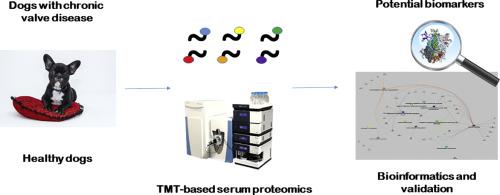当前位置:
X-MOL 学术
›
J. Proteomics
›
论文详情
Our official English website, www.x-mol.net, welcomes your
feedback! (Note: you will need to create a separate account there.)
Serum proteome profiling in canine chronic valve disease using a TMT-based quantitative proteomics approach.
Journal of Proteomics ( IF 2.8 ) Pub Date : 2020-05-16 , DOI: 10.1016/j.jprot.2020.103825 Josipa Kuleš 1 , Petra Bilić 1 , Anita Horvatić 1 , Alan Kovačević 2 , Nicolas Guillemin 1 , Blanka Beer Ljubić 1 , Asier Galan 1 , Ines Jović 1 , Marin Torti 1 , Ivana Rubić 1 , Peter David Eckersall 3 , Vladimir Mrljak 1
Journal of Proteomics ( IF 2.8 ) Pub Date : 2020-05-16 , DOI: 10.1016/j.jprot.2020.103825 Josipa Kuleš 1 , Petra Bilić 1 , Anita Horvatić 1 , Alan Kovačević 2 , Nicolas Guillemin 1 , Blanka Beer Ljubić 1 , Asier Galan 1 , Ines Jović 1 , Marin Torti 1 , Ivana Rubić 1 , Peter David Eckersall 3 , Vladimir Mrljak 1
Affiliation

|
Chronic valve disease (CVD) is the most common clinically significant heart disease of dogs, affecting 20 to 40% of dogs. The aim of this study was to evaluate the serum protein profile of healthy and CVD affected dogs, by means of an isobaric tandem mass tag (TMT) label-based high-resolution quantitative proteomic approach. Additionally, conventional cardiac biomarkers were measured in the serum, functional bioinformatics analysis was employed for elucidating molecular mechanisms and pathways associated with CVD, and validation of proteomic results was performed by immunoassays and Western blotting. Of 290 identified and quantified proteins, 15 proteins showed significantly different abundances (p < .05), including antithrombin-III, alpha-2-antiplasmin, tetranectin, apolipoprotein M, adiponectin, inter-alpha-trypsin inhibitor heavy chain H1, gelsolin and apolipoprotein B-100. The identified proteins with differently abundances are involved in a number of pathways, such as complement and coagulation cascades, haemostasis, regulation of actin cytoskeleton, lipid metabolism and transport. We found comparative similarities with human disease in terms of identified proteins and GO pathways, which confirmed similar pathophysiology of this disease, but also differences, mainly in lipid metabolism. SIGNIFICANCE: There have been few investigations of canine serum proteome despite the potential for biomarker discovery and comparative disease analysis. Establishing serum proteomic signatures in healthy dogs and dogs with CVD will benefit for understanding the aetiology of disease in dogs, identify putative biomarkers and provide models of comparative human disease. Circulating biomarkers are important for understanding of the mechanisms of cardiovascular disease and high incidence of CVD in dogs prioritizes the search for novel biomarkers.
中文翻译:

使用基于TMT的定量蛋白质组学方法对犬慢性瓣膜疾病进行血清蛋白质组分析。
慢性瓣膜疾病(CVD)是犬中最常见的临床上重要的心脏病,影响20%至40%的犬。这项研究的目的是通过基于等压串联质量标签(TMT)标签的高分辨率定量蛋白质组学方法评估健康和CVD患犬的血清蛋白谱。另外,在血清中测量常规的心脏生物标志物,使用功能性生物信息学分析来阐明与CVD相关的分子机制和途径,并通过免疫测定和蛋白质印迹法对蛋白质组学结果进行验证。在290种已鉴定和定量的蛋白质中,有15种蛋白质的丰度差异显着(p <.05),包括抗凝血酶III,α-2-抗纤溶酶,四连蛋白,载脂蛋白M,脂联素,α-胰蛋白酶抑制剂重链H1,凝溶胶蛋白和载脂蛋白B-100。鉴定出的具有不同丰度的蛋白质参与许多途径,例如补体和凝血级联,止血,肌动蛋白细胞骨架调节,脂质代谢和转运。我们在鉴定的蛋白质和GO途径方面发现了与人类疾病的比较相似之处,这证实了该疾病的相似病理生理,但也存在差异,主要在脂质代谢方面。意义:尽管有生物标志物发现和比较疾病分析的潜力,但对犬血清蛋白质组的研究很少。在健康犬和患有CVD的犬中建立血清蛋白质组学特征将有助于理解犬病的病因,鉴定假定的生物标志物并提供可比较人类疾病的模型。
更新日期:2020-05-16
中文翻译:

使用基于TMT的定量蛋白质组学方法对犬慢性瓣膜疾病进行血清蛋白质组分析。
慢性瓣膜疾病(CVD)是犬中最常见的临床上重要的心脏病,影响20%至40%的犬。这项研究的目的是通过基于等压串联质量标签(TMT)标签的高分辨率定量蛋白质组学方法评估健康和CVD患犬的血清蛋白谱。另外,在血清中测量常规的心脏生物标志物,使用功能性生物信息学分析来阐明与CVD相关的分子机制和途径,并通过免疫测定和蛋白质印迹法对蛋白质组学结果进行验证。在290种已鉴定和定量的蛋白质中,有15种蛋白质的丰度差异显着(p <.05),包括抗凝血酶III,α-2-抗纤溶酶,四连蛋白,载脂蛋白M,脂联素,α-胰蛋白酶抑制剂重链H1,凝溶胶蛋白和载脂蛋白B-100。鉴定出的具有不同丰度的蛋白质参与许多途径,例如补体和凝血级联,止血,肌动蛋白细胞骨架调节,脂质代谢和转运。我们在鉴定的蛋白质和GO途径方面发现了与人类疾病的比较相似之处,这证实了该疾病的相似病理生理,但也存在差异,主要在脂质代谢方面。意义:尽管有生物标志物发现和比较疾病分析的潜力,但对犬血清蛋白质组的研究很少。在健康犬和患有CVD的犬中建立血清蛋白质组学特征将有助于理解犬病的病因,鉴定假定的生物标志物并提供可比较人类疾病的模型。











































 京公网安备 11010802027423号
京公网安备 11010802027423号